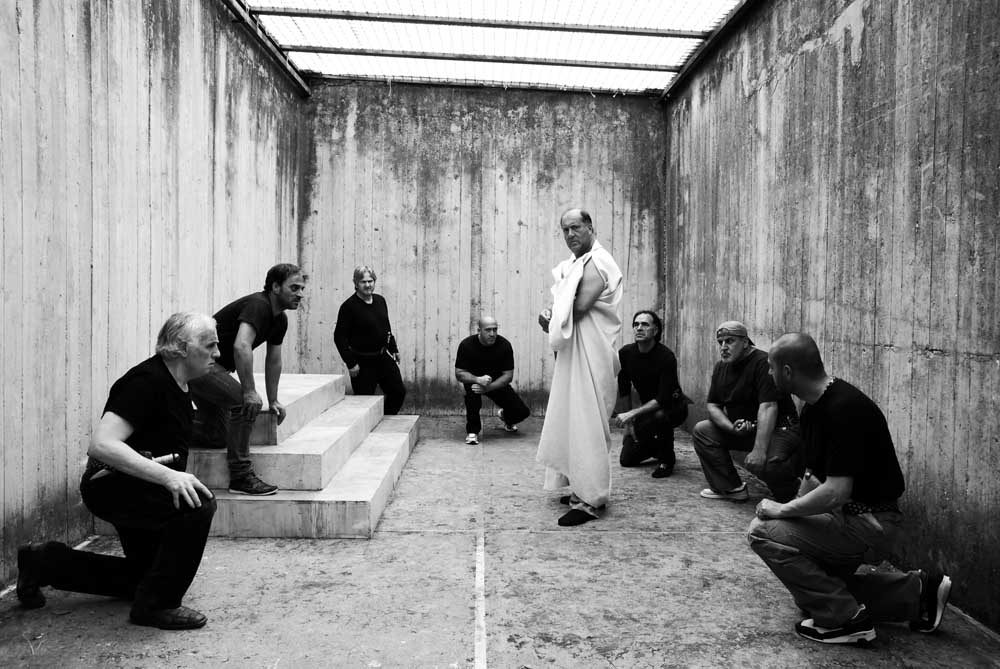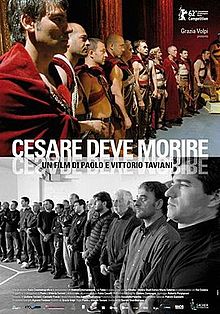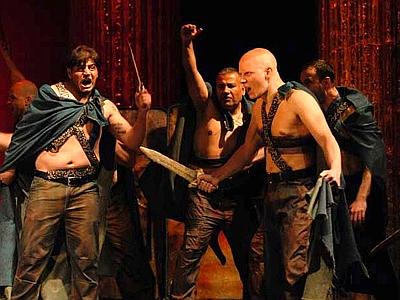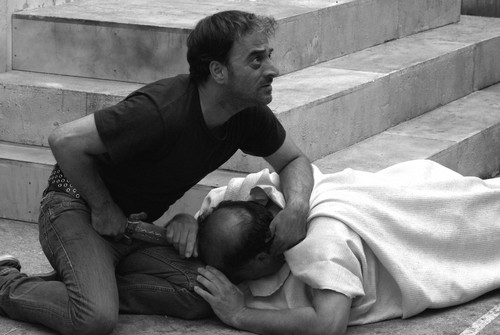Cesare deve morire (Caesar Must Die)
Directed by Paolo Taviani and Vittoria Taviani
Written by William Shakespeare (excerpts from “Julius Caesar”), Paolo Taviani and Vittoria Taviani
2012, Italy
Anyone who walks into a screening of Caesar Must Die with the belief that they will be seeing a documentary should know this now: Caesar Must Die is not a documentary. It can barely be called a docudrama. It rather belongs in the curious category of metafilm, nestled among those pictures that blur and obscure the line between fact and fiction, demolish the fourth wall and are so conscious of themselves that they may disappear into a spiral of self-referentiality. Metafilms can be some of the most innovative and invigorating pieces of cinema when successful, but when they are not they can materialise as hollow exercise or dense nuggets of intellectual tedium.
This film by the brothers Taviani, awarded the Golden Bear at this year’s Berlinale by a jury presided over by Mike Leigh, slots in somewhere near the mid to lower end of the metafilm sliding scale. Conceptually, it is a fascinating exercise (already the word surfaces). For six months Paolo and Vittoria Taviani and their film crew stationed themselves in the high-security wing of the Roman prison Rebibbia to document theatre director Fabio Cavalli undertake the task of staging Shakespeare’s a public performance of Julius Caesar with a cast made up entirely of inmates. Were this an ordinary documentary (or a documentary at all), this subject matter would have been more than ample: a man of presumed culture and refinement attempting to muster satisfactory if not great performances from a gang of assumedly hardened and artless men serving sentences for crimes ranging from drug trafficking to murder. One may imagine that the nature of The Bard’s tale of tyranny, betrayal, honour and redemption might play into the actors’ own histories to intriguing effect. There are definite hints and allusions to these parallels in the film’s brief runtime, but this doesn’t appear to be Caesar Must Die’s main interest.
The film that this most resembles, in terms of conceit and concept, is Abbas Kiarostami’s 1990 masterpiece Close-Up. Now, that is a vastly superior film by any account, but what the two do have in common is the dissolution of the fact-fiction interface. To produce Close-Up, Kiarostami filmed a re-enactment of an actual event with the persons involved in that incident playing themselves in what would appear – to anyone unfamiliar with the backstory – to be a normal fictional narrative film. One of the joys cinephiles gain from watching that breed of film is in debating what exactly it is as a piece of cinema, and whether, why and how one designation is more relevant that the other. What the Tavianis seem to be doing with Caesar Must Die is to stage not only the final public performance of Julius Caesar as well as the preceding months of rehearsal, but also the interactions that the inmates have out of character during those months of rehearsal. (With the exception of the final performance, the film is shot in a theatrically crisp and shadowy black & white). It becomes almost impossible to distinguish when a scene from the play is being recited and when the scene itself is being discussed, wrestled with and contemplated by the actors. Ultimately, this is of little consequence considering the film is in many ways simply an abridged version of Shakespeare’s play from beginning to end, with key scenes played out at different times during the six month period and intercut with each other. It may even be that the scenes become more elaborate and are performed with greater conviction and urgency towards the end of the film as the inmates approach the day of reckoning.
As a concept the film is intriguing, but in practice it often feels inauthentic in a way that almost belittles and does injustice to the admirable undertaking these select few men have committed to. By depriving them of non-staged moments, the inmates themselves become narrative constructs in the story of their own lives, at least six months of it. Sure, this may be part of the novelty, but was this the initial intent in Paolo and Vittoria Taviani’s minds when they embarked on the project, or was this approach simply a concession to an unavoidable tendency by the actors to perform at all times (a common overcompensation by people unaccustomed to a camera’s gaze)? Yet, if one watches the film closely enough, there isn’t a documentary anywhere as immaculately constructed, complete with reaction shots, perfectly timed focus racks and suspiciously precise blocking. The one instance in which there is a clear break in character between two of the actors is not only a lost opportunity, but the very moment when the film unintentionally bares its arse. Frankly, the entirety of this film must have been scripted, which is interesting considering the considerable drop in performance quality when the actors transition from Shakespeare to Taviani. Nonetheless, it is disarming how not bad many of the inmates are. Giovanni Arcuri as Caesar is perfect in almost every way as the tyrannical emperor, as is Salvatore Striano who plays Brutus. He is the tortured artist of the group. Perhaps the standout of the ensemble though, with his thoughtful face and air of gravity, is Cosimo Rega, the man who plays Cassius.
The real value of the film lies perhaps in its attempts to exhibit the transformative value of art. The final line of the film, once again during a moment no less staged than an opera at the Met, is spoken by Cosimo Rega, the one prisoner in the production we are told has been sentenced to life in prison for murder, the man who gets top billing on the cast list. His words are: ‘ever since I came to know art, this cell has become a prison.’ But if this film fails to demonstrate obvious examples of any such transformation, it’s probably because the Rebibbia theatre is an established institution, in which case the men we see might be well into their butterfly stage. It is quite surprising to see how mild-mannered, dignified and quietly motivated all the inmates involved in the production are. Maybe the plethora of prison stereotypes purveyed by bad art has led to certain unfair expectations, but for those still hoping to see big bad Al Capone blooming into Laurence Olivier, Caesar Must Die is not your movie.
Tope Ogundare
Visit the official website for the Melbourne International Film Festival










